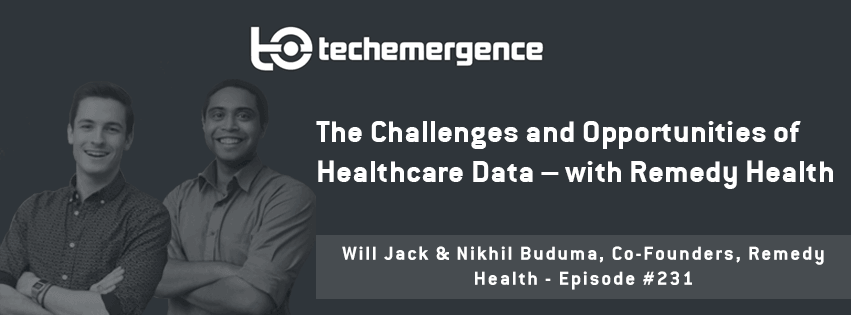
Episode summary: Guests Will Jack and Nikhil Buduma co-founders of Remedy Health Inc discuss the challenges involved in collecting, setting up and structuring data in order to implement AI in healthcare. By the end of this episode, listeners will have gained insight into the challenges of healthcare data systems, and the potential solutions to cleaning and organizing this data for healthcare AI applications.
Expertise:
Will Jack: Physics and computer science combined with a venture investments in early stage technology.
Nikhil Buduma: A background working on machine learning systems at MIT combined with investments in early stage companies.
Brief recognition:
Will Jack: After studying physics and computer science at MIT, Jack worked on SpaceX’s internet satellite project. As CEO of Remedy Health, Jack is working to implement AI to increase the accessibility and affordability of primary healthcare.
Nikhil Buduma: Two-time medalist at the International Biology Olympiad. At MIT he specialized in developing large-scale data systems to help in the field of mental health. Today he is the co-founder and chief scientist at Remedy Health and in his spare time, an investor in hard technology and data companies through is venture fund Q Partners. He is the author of the O’Reilly Fundamentals of Deep Learning.
Current Affiliations:
Will Jack: Co-founder and CEO of Remedy Health, venture partner with Alsop Louie.
Nikhil Buduma: Co-founder and chief scientist at Remedy Health, board member of Lean On Me, a mental health non-profit.
Big ideas:
Making Medical Data Collection, Storage and Retrieval More Consistent
Because medical data software is outsourced and designed by companies who have little or no medical knowledge, they are inconsistent and largely unable to communicate with each other. The development of an automated system to help physicians input patient and diagnostic data seamlessly and consistently will save time and money and keep patients and doctors happy. It will also make the data more accessible. Because the current system is so complicated and fragmented, it would be virtually impossible to rip and replace the current software, so ultimately the whole system needs to be replaced.
Turning Insight to Action:
As a health care provider, think about how a nationally integrated healthcare data system can help your practice provide better healthcare and save time and money. As an investor in technological research and development within the healthcare space, consider how bringing together a structured team skilled in both medical data management and data system development can lead to massive innovation within the arena, not just for information collection, storage and retrieval but also for machine learning and eventually AI possibilities. Innovators in healthcare AI will inevitably need to be familiar with the origins and sources of healthcare data.
Interview Highlights:
The following is a condensed version of the full audio interview, which is available in the above links on Emerj’s SoundCloud and iTunes stations.
(2.46): What are some of the persistent problems with healthcare data?
Will Jack: One major one is that most of the data associated with the diagnostic thought process, essentially collecting information that informs diagnosis, should ideally be recorded as a physician’s note in the medical record…People are not necessarily consistent with the information they record in a medical record: it’s just not a complete picture of care. The medical record might be a phenomenal record for a lot of diagnostic testing, but for the conversation between a doctor and a patient, which is oftentimes the meat of what drives the diagnosis, it’s completely and totally gone.
Nikhil Buduma: Think about, from your perspective as a patient, if you realize that the reason you’re paying so much money for your care is because this highly educated doctor in front of you is spending all of their time just entering information into a medical record, and you’re paying for all that time, that’s not a great situation…The goal is, if we can find some mechanism for automated technology to do that, without wasting the doctor’s time, that’s the goldmine.
Will Jack: If we can somehow seamlessly capture the relevant data in a highly structured, thorough, repetitive, granular method, we remove that burden from the physician. The physician is happier, we save the patient money and we get the kind of data we need to do the game-changing AI work.
(8.08) What are some of the other pervasive issues that keep up from leveraging healthcare data in an effective way?
Nikhil Buduma: One of the core problems that ends up happening is the people who understand the kinds of information that need to be captured are doctors, and yet hospitals and healthcare systems as a whole don’t own or writer their own data management software. Instead, what ends up happening is it’s outsourced to a third party that doesn’t really have a good understanding of how the data ought to be capture and how we should extend those data models to add new use to the system…A health system here at Stanford may have a completely different architecture than one at Kaiser. A doctor may try to understand how the data is stored, but there’s so much technical jargon and it’s so disjointed all over the place that one system may not even store data in a way that can talk to another system.
(10.42): The resolving of that problem seems rather difficult. Is this an inevitable process of healthcare systems eventually finding and setting aside 2 or 3-year projects to strip stuff out of these ridiculous monsters and put them into more organized systems?
Will Jack: This idea of systems getting jumbled up and becoming cludges is not unique to healthcare. If you look at almost any industry this happens. It allows someone to step in as a very efficient lightweight, high quality, vertically integrated player and essentially scale out and become the new system. Innovation rarely happens from within, it’s usually a party stepping in form the outside. I don’t think healthcare systems are going to be able to dig themselves out of this current hole they’re in, it would be exceptionally expensive, it would probably incur a lot of downtime. If you have multiple payers trying to do this, it would be very difficult to agree on a common set of standards and protocols. It’s a total mess. This is basically why we exist and why we as a company are doing what we are doing.
(13.40) So these (current system) will eventually fade out the old abandoned Frankenstein, you think that’s the transition?
Nikhil Buduma: I think that’s the transition and tackling this problem requires a key understanding of both the kinds of information that the systems ought to store and it requires a lot of medical expertise, but it also means that you have to marry that medical expertise with as strong understanding of how you build these data systems in the first place. Part of the reason it’s taken so long for us to see innovation in this space is because that breed of people who understand both together very effectively is almost nil. That’s changing and that’s what’s exciting about this.
(16.31) What are we really competing on for the big game here?
Nick Buduma: Our perspective is very distinct. We’re trying to be the best place to people to come for their healthcare. A good business model understands what the consumer wants. Today, the consumer does not pick Kaiser over Sutter Health because they think Kaiser has a slightly better patient portal, they pick Kaiser or Sutter Health because they like their doctor. For the same reason, we have to be building a healthcare system where people feel like they’re getting incredible care from incredible doctors.
Will Jack: The fact is that owning this kind of data and allowing for this kind of care, it’s like a step function change of the quality of care we can provide. On the access front, – just being able to pull out your phone – on the affordability front – we’re saving doctors so much time we’ve driven down the cost of providing care and on the quality front we’re being more exhaustive and using data to provide better care. If we can do all of these things in our system…why don’t we just build the system, why do we sell it to other people? If we think we can provide the best care in the world, because we leverage these advantages we should do that. At the end of the day it’s what the patient wants.










